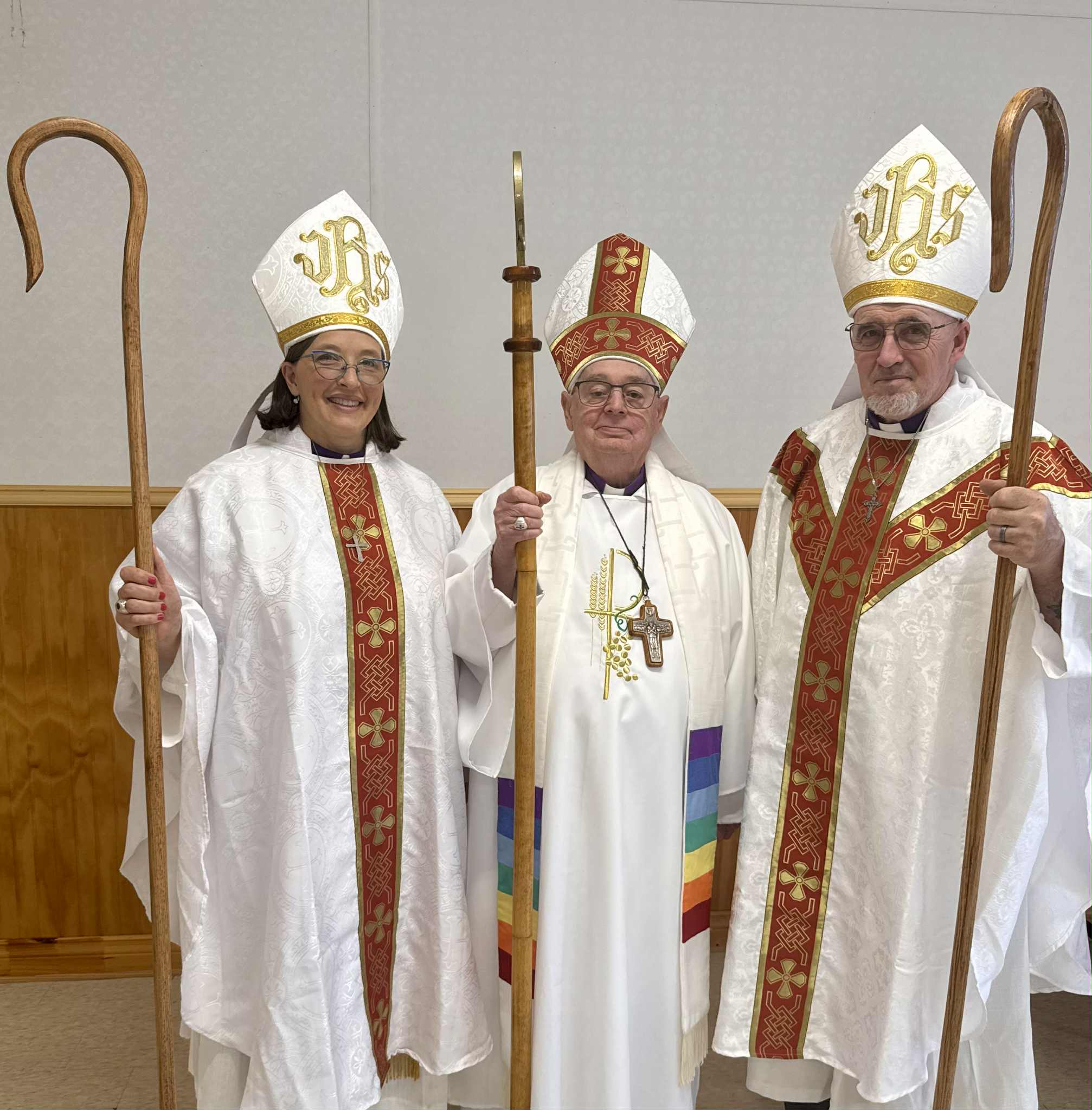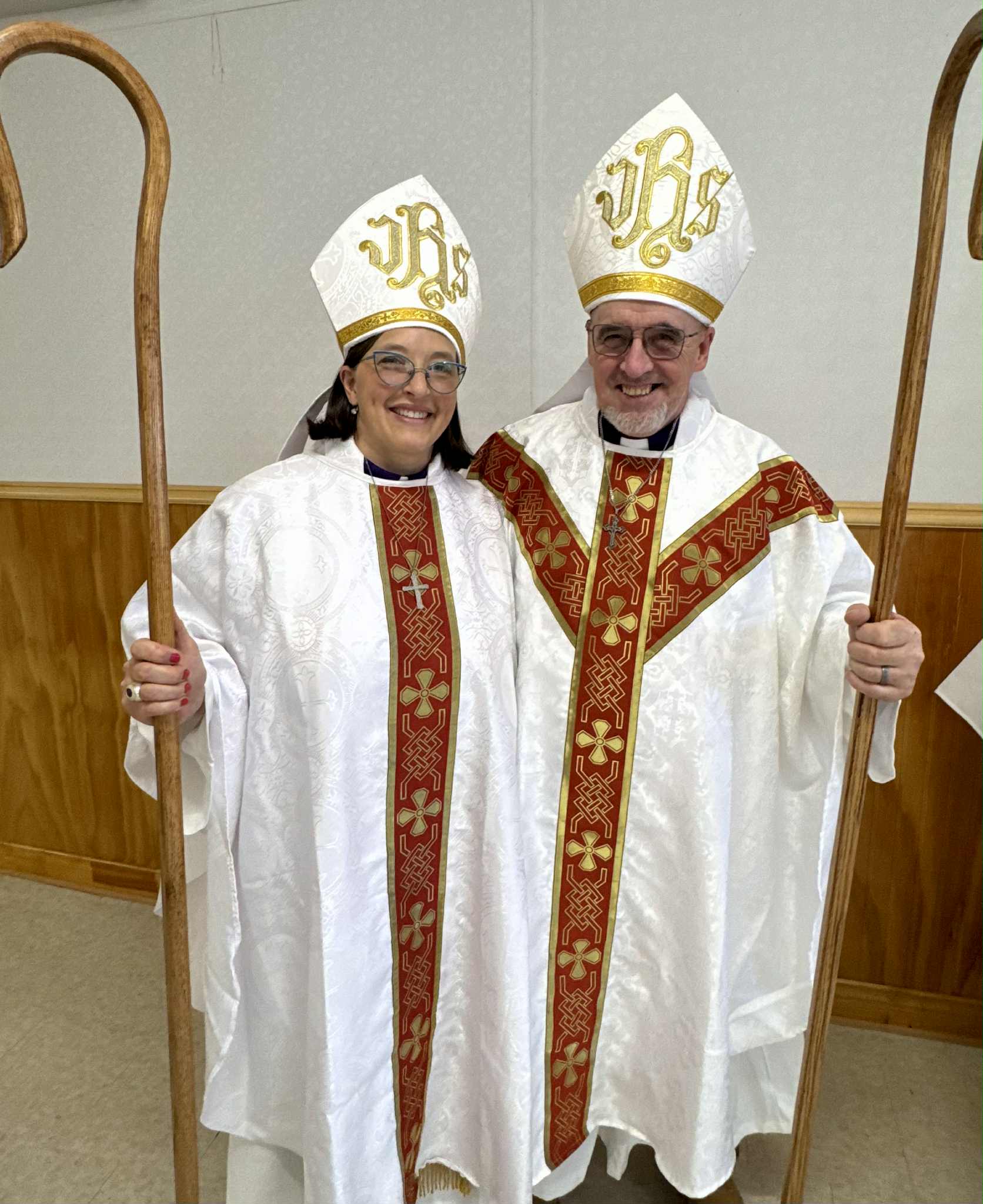- Home
- about stbrigits
- What Is The Importance of The Episcopate to The Church?
Simply Catholic and Welcoming You
What Is The Importance of The Episcopate to The Church? - Churches Where the Episcopate is Essential

Archbishop Thomas Twose (center) Flanked by Provincial Bishop Charlene Bradley (left) ad Archbishop Philip Bradley (right)
The episcopate is important to the Church for its role in governance, spiritual leadership, and unity. Bishops provide a line of authority, claim apostolic succession to ensure the continuity of the faith, and are responsible for overseeing dioceses, teaching doctrine, and ordaining clergy. The office of the bishop connects the local church to the universal church and symbolizes a crucial element of the faith's order and tradition.
The importance of the episcopate to the Church varies significantly depending on the Christian denomination.
For Some Denominations: The Episcopate is deemed Essential to the Church's Being (Esse)
Churches Where the Episcopate is Essential
For the Roman Catholic, Eastern Orthodox, Oriental Orthodox, St. Brigit’s Community Catholic Church and Anglican churches (among others, including some Lutheran and Methodist bodies), the episcopate is considered essential to the very structure and fullness of the Church (esse or plene esse of the church).
For these churches the episcopate is considered an essential, divinely mandated element of the Church's structure and an integral part of its identity.
- Apostolic Succession: The core of this belief is the doctrine of apostolic succession, which holds that bishops trace their office in a direct, uninterrupted line back to the original Twelve Apostles through the laying on of hands in ordination/consecration. This continuous transmission is seen as a guarantee of doctrinal continuity, the legitimate exercise of spiritual authority, and the valid administration of the sacraments.
- Unity and Governance: Bishops serve as the personal and visible symbol of the local church's unity with the universal Church. They are the chief pastors responsible for guarding the faith, unity, and discipline of the church, and for overseeing a specific geographic area (a diocese).
- Leadership: They provide leadership within their dioceses, guiding the church and its members through teaching, ruling, and judging.
- Link between churches: The bishop acts as a link between the local church and the universal church, connecting regional congregations to the larger body of believers.
- Symbol of unity: The office of the bishop is seen by many denominations as a sign of the church's unity and its commitment to a common order of faith.
- Continuity of faith: The episcopate ensures the church's continuity through history, providing a stable and authoritative structure for its spiritual and administrative life.
- The episcopate serves as a visible sign and locus of the Church's unity across different regions and through history. Bishops, often as a "college" with the Pope (in the Latin Rite of the Catholic Church) or in synods, are responsible for safeguarding the faith, maintaining discipline, and providing pastoral leadership within their dioceses.
- Chief Teacher: Bishops are the principal teachers of the faith within their jurisdiction, ensuring the correct proclamation and interpretation of the Gospel and sound doctrine.
- Sacramental Authority: Only bishops possess the fullness of the sacrament of Holy Orders and can validly ordain priests, deacons, and other bishops. They are also the ordinary ministers of confirmation/chrismation and the consecration of others to the episcopate.
- Upholding doctrine: Bishops are seen as the principal teachers of the faith, ensuring that the church's teachings remain faithful to the apostolic tradition.
- Presiding at the Eucharist: Historically and currently, bishops preside over the Eucharist, the central act of Christian worship.
What Is The Importance of The Episcopate to The Church? - Churches Where the Episcopate is Not Essential

Archbishop Philip (Plib) Bradley and his wife Provincial Bishop Charlene Bradley
For These Denominations: The Episcopate is deemed to be Beneficial but Not Essential (Bene Esse or Plene Esse)
Many Protestant denominations, including some Lutheran and Methodist churches, have retained a form of episcopal governance but repudiated the necessity of the historic episcopate for the Church's essence or for valid ministry.
- Alternative Governance: These churches generally do not have bishops in the traditional, hierarchical sense. They believe the system is not explicitly commanded in the New Testament and often use Presbyterian (governance by a council of elders) or congregationalist (local church autonomy) polities instead.
- "Overseer" Function: While they reject the distinct, hierarchical office of bishop with exclusive sacramental powers, they often still recognize the function of an "overseer" (episkopos in Greek) as essential for good order and mission. This oversight role might be carried out by elected national or synodical presidents or other designated leaders who do not necessarily claim apostolic succession.
- Diverse Views: The modern debate in these traditions often divides the importance of the episcopate into three categories: necessary for the being of the Church (esse), necessary for its well-being (bene esse), or necessary for the Church to be fully itself (plene esse).
- Administrative Oversight: In many of these churches, a bishop is an important administrative and pastoral leader, responsible for appointing clergy, overseeing a geographical area (a conference or district), and ensuring discipline.
- Focus on Doctrine and Mission: The role is often seen as an "overseer" (the literal meaning of the Greek word episkopos), vital for providing leadership and guiding the church in its mission and teaching, but not necessarily tied to a specific theory of unbroken tactile succession from the apostles.
Summary of Importance
In traditions with an episcopal polity, the episcopate is fundamental to the Church's structure, continuity, and sacramental life. In many other Christian traditions, while an overseeing role is considered essential, the specific hierarchical structure and the concept of a direct, unbroken historic succession of bishops is not deemed necessary for the Church to be a true church.
So, again the importance of the episcopate to the Church varies significantly depending on the Christian denomination.
In essence, for a large segment of Christianity, the episcopate is a divinely mandated office, integral to the Church's identity and function as founded by Christ. For others, while an oversight function is necessary for good order, the specific, hierarchical structure of the historic episcopate is considered a matter of historical development rather than a divine necessity for a valid church.
For those of us in St. Brigit’s Community Catholic Church the episcopal office is considered essential and must have full Apostolic Succession and valid priesthood standing. We are Old Catholic and Apostolic in our origins and trace our Apostolic lineage through multiple lines in Western and Eastern, Catholic and Anglican branches of the One, Holy, Catholic and Apostolic faith.
Recent Articles
-
The Basic Catechism of the Catholic Church
Feb 12, 26 11:03 AM
A basic catechism of any rite or branch of the catholic church acts as a primary reference for teaching the faith -
The Divine Office
Feb 07, 26 11:07 AM
The Divine Office The Divine Office, also known as the Liturgy of the Hours or Opus Dei ("Work of God"), is the official, daily set of prayers of the Catholic Church -
Women Being Removed or Voided from Scriptures
Jan 17, 26 05:06 PM
The concept of women being "removed" or "voided" from scriptures refers to both the physical exclusion of female narratives in historical texts...
Boat Harbour West, Newfoundland, Canada. Cell Number 709-276-0626
Join Us Also on Our St. Brigit's Community Catholic Church Prayer group on Facebook: https://www.facebook.com/groups/324523956473448


